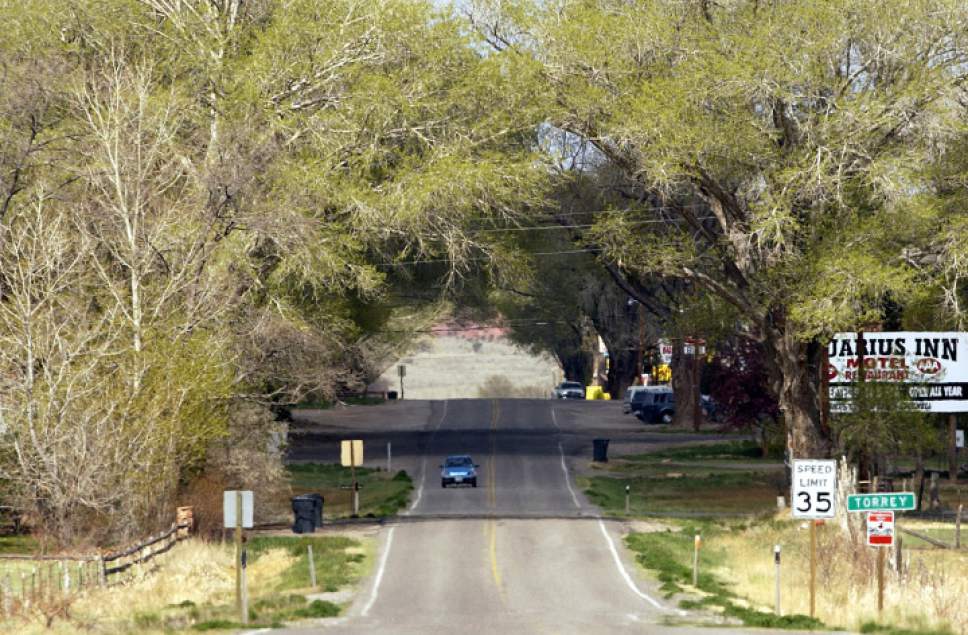This is an archived article that was published on sltrib.com in 2017, and information in the article may be outdated. It is provided only for personal research purposes and may not be reprinted.
The dust may be settling over Teasdale's gravel pit controversy, thanks to a decision by Utah trust lands officials to cancel a mineral lease on the 120-acre state-owned parcel in favor of selling it.
For the past year, the site has been under lease to a Wayne County construction firm that recently won a court ruling that seemed to pave the way for an industrial operation in the scenic agricultural area. But on Wednesday, the School and Institutional Trust Lands Administration gave 30 days' notice to Brown Brothers Construction Co., which was seeking to mine aggregate needed for road work even — though local zoning would preclude such industrial uses.
Nearby residents objected to putting a mine on the wind-swept rise above the Fremont River and Torrey, the historic ranching town that is now a gateway to Capitol Reef National Park and dependent on tourism.
"We are in a celebratory mood," said Ty Markham, a bed-and-breakfast owner and environmental activist. "The blight on our spectacular scenery and what it would do to our economy, disrupt the quiet and beauty, we feel we have a dodged a bullet."
Brown's lease paid $1,200 a year, plus a 70-cent royalty on every cubic yard of sand and gravel removed. Opponents long argued that SITLA could make more money for the school trust fund it supports by selling the land, leading to assertions that allowing the parcel to be mined could violate the agency's fiduciary duty.
This week, SITLA Director David Ure came to agree with that position.
"Our analysis is that the sale price of the property at auction is likely to substantially exceed rentals and royalties from [the parcel] over the lifetime of any gravel pit constructed on the permit premises," Ure wrote in the letter to Brown canceling the gravel lease.
"SITLA is required by law to seek the most profitable course of action in making decisions for the disposition of state trust lands," Ure wrote. "In light of the strong competitive interest in the subject property, we are obligated to allow the market to determine the highest and best use of the property through the auction."
The letter invites Brown to participate in the auction set for October, when the agency hosts its next twice-a-year land sale. The parcel will be put up for bid at the request of the family that owns the neighboring land and holds a grazing permit on the 120-acre trust parcel just east of Teasdale.
Ure's decision comes on the heels of the most recent SITLA auction in which a conservation buyer drove up bids on Needles Outpost, a full section at the entrance to Canyonlands National Park, to a record-setting $2.5 million.
Jennifer Speer, a Salt Lake City conservationist, was bent on keeping the land, which currently has a campground and convenience store serving park visitors, out of the hands of developers.
Ure's letter offered to reimburse Brown's costs associated with preparing the land for a gravel pit and assist the firm in finding an alternative source of sand and gravel on federal land.
Driving the controversy was the exemption SITLA enjoys from local zoning ordinances. The area proposed for the gravel pit is zoned for agricultural and low-density residential uses. County officials authorized the quarry with a conditional-use permit, prompting nearby residents to take Wayne County and Brown to court, arguing the mine would make a mockery of the zoning ordinance. But 6th District Judge George Harmond ruled that trust lands are not subject to zoning, and local authorities can't regulate them with conditional-use permits.
That ruling is under appeal.
The matter is not fully resolved, according to attorney David Van Dyke, whose family hopes to acquire the land which abuts their Teasdale acreage, where they run cattle.
There is nothing keeping Brown Brothers from bidding on the land, which the firm could again seek to mine if its winds up buying it. In that circumstance, the company would have to obtain a zoning variance, which the County Commission seems willing to provide, Van Dyke said.
Mine opponents last month drew a rebuke from Rep. Mike Noel, R-Kanab, who represents Wayne and many other rural counties in the Utah House. At an interim legislative meeting Noel denounced residents trying to block the gravel pit as "hypocrites" because their town depends on mineral royalties to support its water system and schools.
It now appears, though, that the same opposition will result in more revenue for Utah schools.
Brian Maffly covers public lands for The Salt Lake Tribune. Brian Maffly can be reached at bmaffly@sltrib.com or 801-257-8713.
Twitter: @brianmaffly



